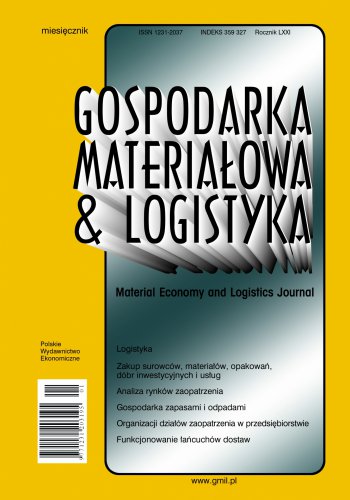City logistics development directions — organizational aspects
Cities are the engines of economic development — between them flows of capital take place, they are the most important centers of education and innovation. More than half of the world's population lives in cities and this number will increase further. Rapid development of urban areas is becoming an increasing challenge for urban planners, especially when it comes to planning transport and logistics systems for passenger and goods flows in urban areas. However, urbanization is conducive to innovations that lead to the design and implementation of new models for organizing flows in cities. The article will present organizational concepts of crowd logistics solutions aimed at streamlining and optimizing the processes of passenger and cargo flows in urban areas. The analysis will cover the possibilities of using the crowd logistics concept, the types of solutions that can be used in this regard, as well as the benefits resulting from their implementation. The author will review the crowd logistics experience and solutions used in metropolitan areas.
References
Bibliografia/References
Arslan, A., Agatz, N., Kroon, L., Zuidwijk, R. (2016). Crowdsourced delivery: a dynamic pickup and delivery problem with ad-hoc drivers. SSRN Electronic Journal: 1–29. https://doi.org/10.2139/ssrn.2726731.
Buldeo Rai, H., Verlinde, S., Merck, J., Macharis, C. (2017). Crowd logistics: an opportunity for more sustainable urban freight transport? Eur. Transp. Res. Rev. 9: 39, https://link.springer.com/content/pdf/10.1007%2Fs12544-017-0256-6.pdf. https://doi.org/10.1007/s12544-017-0256-6.
Civitas Wiki (2015). Smart Choices for cities. Making Urban Freiht Logistics More Sustainable. Retreived from http://www.eltis.org/sites/eltis/files/trainingmaterials/civ_pol-an5_urban_web-1.pdf.
Czupich. A., Ignasiak-Szulc. A., Kola-Bezka. M. (2016). Czynniki i bariery wdrażania koncepcji smart city w Polsce, Studia Ekonomiczne, Zeszyty Naukowe Uniwersytetu Ekonomicznego w Katowicach, s. 276.
Eckhardt, G. M., Bardhi, F. (2015). The Sharing Economy Isn't About Sharing at All. Harvard Business Review, 28th January.
Gonzales-Feliu, J., Semet, F., Routhier, J. -L. (2014). Sustainable Urban Logistics: Concepts, Methods and Information System. Springer. Retrieved from http://www.springer.com/gp/book/9783642317873. https://doi.org/10.1007/978-3-642-31788-0.
Hajduk, S. (2017). Bibliometric analysis of publications on city logistics in international scientific literature. Procedia Engineering, 182. https://doi.org/10.1016/j.proeng.2017.03.194.
Dimitrou, H. T., Gakenheimer, R. (2011). Urban Transport in the Developing World. A Handbook of Policy and Practice. Edward Elgar, Northampton.
Kiba-Janiak, M. (2016), Kluczowe czynniki sukcesu logistyki miejskiej z perspektywy zarządzania miastem, Prace Naukowe Uniwersytetu Ekonomicznego we Wrocławiu, nr 420, Wrocław. https://doi.org/10.15611/pn.2016.420.13.
Komninos, N. (2008). Intelligent Cities and Globalisationof Innovation Networks, London and New York, Routledge.
Markowski, T., Marszał, T. (2006). Metropolie, obszary metropolitalne, metropolizacja. Problemy i pojęcia podstawowe. Warszawa: KPZK PAN.
Mckinnon, A. (2016). Crowdshipping — a communal approach to reducing urban traffic levels? Kuehne Logistics University, Logistics White Paper, 1.
Mizielińska-Chmielewska, M. (2018). Inteligentne miasta podążają za modelem ekonomii współdzielenia. Inteligentnemiasta.com.
Olender-Skorek, M. (2017). Rosnące znaczenie współdzielenia we współczesnej gospodarce, Ekonomiczne Problemy Usług 1 (126). https://doi.org/10.18276/epu.2017.126/1-26.
Pasternak, Ł., Sadowski, A. (2014). Bariery i ograniczenia w logistyce miejskiej, Studia Miejskie, 15.
Sampaio, A., Savelsbergh, M., Veelenturf L., VanWoensel T., (2017). Crowd-based City Logistics, SCL Report Series Crowd-based City Logistics. https://doi.org/10.1016/b978-0-12-814242-4.00015-6.
Szołtysek, J. (2007). Podstawy Logistyki Miejskiej. Katowice: Wyd. Akademii Ekonomicznej w Katowicach.
Szołtysek, J. (2014). City logistics perspectives. Logistyka, 4.
Taniguchi, E. (2014). Concepts of city logistics for sustainable and liveable cities. Procedia — Social and Behavioral Sciences 151. Retrived from http://www.sciencedirect.com/science/article/pii/S1877042814054718. https://doi.org/10.1016/j.sbspro.2014.10.029.
Taniguchi, E. (2001). City logistics: Networking Modelling and Intelligent Transport System. United Kongdom, Elsevier. Taniguchi, E., Thompson, R. G. (2015). City logistics. Mapping the future. CRC Press.
Urban Logistic. (2015). How to unlock value from last mile delivery for cities, transporters and retailers, Arthur D. Little FUM.
Witkowski, K. (2007). Aspekty logistyki miejskiej w zarządzaniu infrastrukturą transportową, Sulechów: Wydawnictwo PWSZ.

